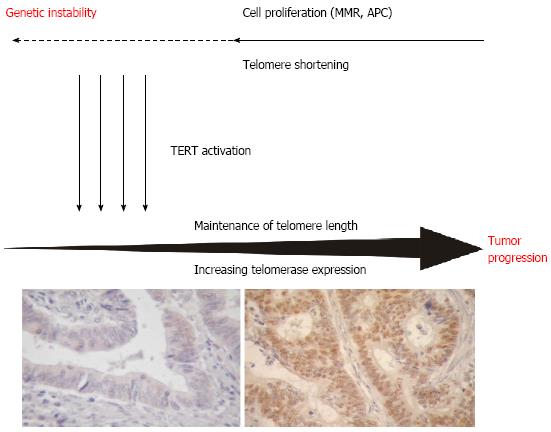Copyright
©2014 Baishideng Publishing Group Co.
World J Gastroenterol. Feb 28, 2014; 20(8): 1940-1950
Published online Feb 28, 2014. doi: 10.3748/wjg.v20.i8.1940
Published online Feb 28, 2014. doi: 10.3748/wjg.v20.i8.1940
Figure 1 Model of telomere/telomerase interplay in the carcinogenesis of colorectal cancer.
Telomere shortening is mainly caused by cell proliferation in preneoplastic lesions. Erosion of telomeres may be accelerated by mutations in specific genes, such as the adenomatous polyposis coli (APC) gene or DNA mismatch repair (MMR) system genes. The activation of telomerase reverse transcriptase (TERT), the catalytic unit of the telomerase, occurs during the adenoma-carcinoma sequence; TERT and telomerase activity levels increase with tumour progression. Inserts: Immunohistochemical analysis of TERT expression in stage I (left) and stage IV (right) tumours. Mayer's haematoxylin counterstaining; original magnification × 20.
- Citation: Bertorelle R, Rampazzo E, Pucciarelli S, Nitti D, Rossi AD. Telomeres, telomerase and colorectal cancer. World J Gastroenterol 2014; 20(8): 1940-1950
- URL: https://www.wjgnet.com/1007-9327/full/v20/i8/1940.htm
- DOI: https://dx.doi.org/10.3748/wjg.v20.i8.1940









